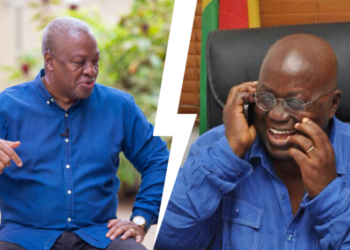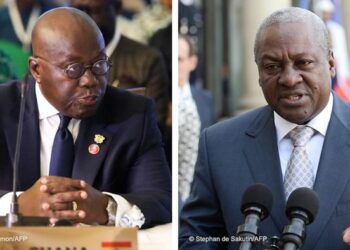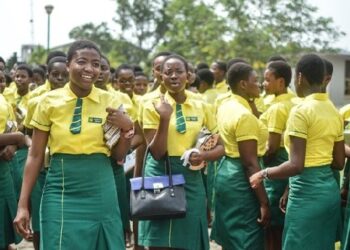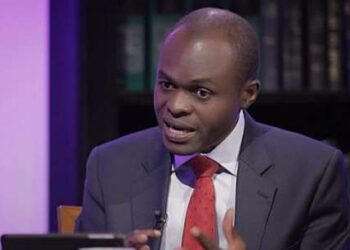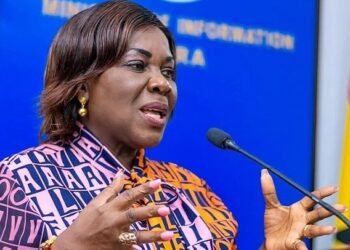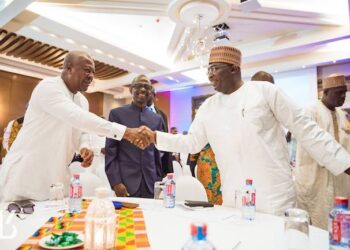Ghana’s presidential throne will be contested in 2024 and as usual a fierce contest is expected between the two leading political parties in the country.
The New Patriotic Party‘s leader and current president of the Republic of Ghana will exhaust his tenure of office during that period and the ruling party will be looking forward to present a new and yet formidable face for leadership.
National Democratic Congress on the other hand, possess no problem of the kind as they already have a candidate who have tried and tested on several occasions.
Ghana had a historic election in the 2020 polls as parliamentary seats were divided equally among the two major parties.
However, the shift from the victorious independent candidate of the Fomena Constituency’s decision to rejoin the New Patriotic Party gave the majority seats of Parliament to the NPP.
This goes to prove that Ghanaians aren’t really certain on which of the major political to trust with the reigns of government hence a much tougher is imminent come 2024.
In light of this reality, we highlight some politicians or candidates who have the potential, capacity and in the positions to grab the throne of Ghana’s Presidency come 2024.
Kennedy Agyapong
Kenedy Ohene Agyapong is a Ghanaian politician and businessman who represents Assin Central in parliament for the New Patriotic Party. He was first elected a member of parliament in 2000 to the seat of Assin North. He retained his seat in the 2004 and 2008 parliamentary elections. In 2012 he was elected in the new seat of Assin Central and was re-elected in 2016. He also retained his seat in the 2020 general elections. He is currently the Chairman of the Parliament’s Defense and Interior Committee.
Kennedy Agyapong still remains one of the politicians who have never lost election. His intellectual work in the 2016 elections resulted in the victory of Nana Addo Dankwah Akufo- Addo. He also contributed immensely to the victory of most NPP parliamentary candidates- such as K.T Hammond and many more.
Kennedy Agyapong chairs the Communication Committee in Parliament, under the current presidency of Nana Akufo-Addo.
Agyapong has vowed to commit suicide if former President John Mahama’s brother, Ibrahim, is not jailed by the Akufo-Addo government for some corrupt activities which, according to Agyapong, have led to the state losing money. One example he claimed, was the defaulting of payment of taxes by Ibrahim Mahama for more than a year period when his brother was President of the Republic of Ghana. Agyapong’s personal campaign on the issue to bring it to media attention led to the investigation of Ibrahim Mahama and subsequent agreement of Ibrahim Mahama to pay the said taxes. This action earned Kennedy Agyapong praises from a wide section of Ghanaians.
Agyapong’s indirect attack on the Electoral Commissioner of Ghana Charlotte Osei for, he alleged, trading sex for her position as the Electoral Commissioner (EC) boss brought upon him criticisms from various leaders including Queen mothers and human rights activists as well as other members of parliament. In 2018, following the arrest of Ghana Football Association president Kwasi Nyantakyi, he said that anti-corruption investigative journalist Anas Aremeyaw Anas should be stopped before he started investigating people in their “bedrooms whilst asleep”.[13] He has repeatedly threatened Anas and was condemned internationally by the Committee to Protect Journalists and Reporters Without Borders he stated that Anas’ methods were ‘unfair’. Speaking live on Adom FM on 4 June 2018, he called Anas “a blackmailer, an extortionist”, mimed his throat being cut and said he should be “hanged.”He also called for “retribution” against Anas’ fellow reporter, Ahmed Hussein-Suale, saying “If he comes here, beat him… Whatever happens, I’ll pay.” Hussein-Suale was subsequently assassinated.
In July 2018, he was cross-examined for contempt of Parliament.
He is believed to be the first Ghanaian individual to own an ¢8 million Rolls Royce and is believed to also own a private jet, sparking calls for an investigation from the Customs Excise and Preventive Service into his wealth.
Dr. Bawumia
Mahamudu Bawumia (born 7 October 1963) is a Ghanaian economist and banker and the current Vice President of Ghana. He assumed office on 7 January 2017.
Bawumia was a Deputy Governor of the Bank of Ghana until his nomination as the vice presidential candidate of the New Patriotic Party (NPP) in 2008, standing alongside presidential candidate Nana Akufo-Addo. He also ran as the NPP vice-presidential candidate in the 2012 general elections and was the lead witness for the petitioners in the 2012/2013 Presidential Election Petition which challenged the declaration of John Mahama as the winner of the election. He is married to Samira Ramadan and has four children.
From 1988 to 1990, Bawumia worked as a lecturer in Monetary Economics, and International Finance at the Emile Woolf College of Accountancy in London, England. He also served as an economist at the Research Department of the International Monetary Fund in Washington, DC, USA.
Between 1996 and 2000, Bawumia served as an Assistant Professor of Economics in the Hankamer School of Business at Baylor University in Waco, Texas, USA, where he also received the Young Researcher Award in 1998. He was listed in “Who is Who Among America’s Teachers’ in 1999.
Bawumia returned to Ghana in 2000 to work as an economist at the Bank of Ghana. He rose from Senior Economist to Head of Department, and subsequently as Special Assistant to the Governor of the Bank. President John Kufuor appointed Bawumia as Deputy Governor of the Bank of Ghana in June 2006.
At the Bank of Ghana Bawumia :
As Head of the Monetary Policy and Financial Stability Department, he was part of the team that designed and implemented the inflation-targeting framework that continues to guide monetary policy and the workings of the Monetary Policy Committee at the Bank of Ghana. The inflation-targeting framework established reduced inflation from over 40% in 2000 to 10.2% by 2007 (i.e., before the oil price shock of 2007/2008) while maintaining relative exchange rate stability.
Was part of the team that was instrumental in designing and implementing policy initiatives such as the abolition of the secondary reserve requirements and the opening up of the banking sector to competition. This resulted in a major increase in the availability of credit to the private sector from 12.5% of GDP in 2001 to 28.5% of GDP by 2008.
Led Bank of Ghana’s technical negotiation team and was on the government team that negotiated with the World Bank and International Monetary Fund since 2001 through HIPC and PRGF. Partly as a result of these negotiations, Ghana by 2007 successfully ended its dependence on IMF assistance.
Served as a member of the Government technical negotiating team on HIPC Paris Club and Completion Point Negotiations. Ghana completed the HIPC process successfully with significant debt relief of close to $4 billion.
Was a member of the Government Team to Negotiate the Millennium Challenge Account Compact with the US Government. The MCA resulted in many significant projects such as the recently inaugurated George Bush Highway.
Was a member of the Government Technical Team on the Deregulation of Ghana’s Petroleum Sector.
As Chairman of the Capital Markets Committee, was responsible for the strategy for accessing the international capital markets with a debut US$750 million, which was four times oversubscribed.
Was part of the team that designed and implemented the successful redenomination of the cedi. Through this process, the cedi was considerably strengthened. Significant savings were also made by the Bank of Ghana in currency printing costs.
Was involved in the design and implementation of the e-zwich common platform for all banks, savings and loans companies and rural banks, offering interoperability across different financial institutions.
As the deputy Governor in charge of financial stability, oversaw the soundness of the banking sector.
As Deputy Governor Bawumia served on the Boards of the Bank of Ghana, Ghana International Bank (UK), Ghana Telecom, Revenue Agencies Governing Board, Social Security and National Insurance Trust.
Shortly after the 2008 election Bawumia resigned as Deputy Governor at the Bank of Ghana.
Alan John Kyeremanteng
Alan John Kwadwo Kyerematen (popularly called Alan Cash) (born 3 October 1955) is a Ghanaian politician, corporate executive, diplomat and an international public servant specialising in global trade issues. Kyerematen was ambassador to the United States and later Minister of Trade, Industry, Private Sector Development (PSD) and the Presidential Special Initiatives (PSI), under the President Kufuor-led NPP government. Kyerematen served as a trade advisor at the United Nations Economic Commission for Africa (ECA) in Addis Ababa, Ethiopia, where he coordinated the African Trade Policy Centre (ATPC).
Kyerematen made an attempt at the leadership of the New Patriotic Party in 2007, capturing 32.3% of votes cast. He was first runner-up to Nana Akufo-Addo who gained 47.96% of votes cast.Kyerematen made other attempts at the party’s leadership in 2010 and 2014 but placed second to Akufo-Addo, who won the primaries. In 2012, Ghana nominated Kyerematen for the post of WTO director-general to succeed out-going Director-General Pascal Lamy, and his candidature received the backing of the African Union (AU). However, he did not make the shortlist for the final selection process in 2013. In 2017, Kyerematen was sworn in as Ghana’s Trade Minister.
Kyerematen has been a leading stalwart and key strategist of the NPP since its inception in 1992. He is a founding member of the New Patriotic Party (NPP) and has also served on the highest decision-making bodies of the NPP that shaped the Party’s strategic direction both in opposition and in Government.
He served on the NPP National Executive Committee, serving as a Member from 1992 to 2001 as well as on the Economic Management Team and Finance Committee of the NPP. He is also a Founding Member of the Young Executive Forum (YEF), a powerful advocacy and lobby group within the Party which played a major role in galvanizing the professional and business community to support the growth and development of the party, as well as mobilize a new generation of party faithful and young leaders. As Chairman of YEF from 1992 to 2001, he symbolized the essence and spirit of the new generation of party leaders.
Kyerematen has been one of the privileged few to have held membership of the National Executive Committee for over a decade, under the successive Chairmanships of B.J. DaRocha, Peter Ala Adjetey, Samuel Odoi-Sykes and Haruna Esseku. As a result of his contribution to strategy development within the Party, he was appointed as a Member of the NPP/CPP Great Alliance Negotiating Team.
Kyerematen made an attempt at the leadership of the New Patriotic Party in 2007, capturing 32.30% of votes cast. He was first runner-up to Nana Addo Dankwa Akufo-Addo who gained 47.96% of votes cast. He made another attempt in 2010 where he placed a distant second with 20.40% of total valid votes cast to Nana Akufo-Addo’s 77.92%.[22] In 2014, Kyerematen once again came second to Akufo-Addo in the presidential primaries to elect a flagbearer to lead the NPP in the 2016 general elections. In the super-delegates congress organised to shortlist the number of prospective candidates from 7 to 5, Kyerematen polled 7.97% of the valid votes cast compared to Akufo-Addo’s 80.81%.[23] In the final presidential primary to select the flagbearer, Kyerematen was first runner-up with 4.75% of the votes while archrival Akufo-Addo received 94.35% of the votes to win the contest.
Once asked by a journalist how he became known in the Ghanaian media as “Alan Cash,” Kyerematen said it happened because in political campaigns he stressed the importance of creating jobs and “real cash” for the people.
John Dramani Mahama
John Dramani Mahama born 29 November 1958 is a Ghanaian politician who served as President of Ghana from 24 July 2012 to 7 January 2017.
He previously served as Vice President of Ghana from January 2009 to July 2012, and took office as president on 24 July 2012 following the death of his predecessor, John Atta Mills. Mahama is a communication expert, historian, and writer. He is a member of the National Democratic Congress (NDC), who was a Member of Parliament for Bole Bamboi from 1997 to 2009 and served as Deputy Minister for Communication between 1997 and 1998 before becoming the substantive Minister for Communications from 1998 to 2001.
Mahama is the first vice president to take over the presidency from the death of his predecessor, John Atta Mills, and is the first head of state of Ghana to have been born after Ghana’s independence. He was elected after December 2012 election to serve as full-time President.He contested re-election for a second term in the 2016 election, but lost to the New Patriotic Party candidate Nana Akufo-Addo, in 2012. This made him the first President in the history of Ghana to not have won a second term.
Mahama was first elected to the Parliament of Ghana in the 1996 elections to represent the Bole/Bamboi Constituency for a four-year term. In April 1997, Mahama was appointed Deputy Minister of Communications. He was promoted to the post of Minister of Communications in November 1998, serving in that post until January 2001, when the ruling National Democratic Congress (NDC) handed over power to the New Patriotic Party’s government.[9]
In 2000, Mahama was re-elected for another four-year term as the Member of Parliament for the Bole/Bamboi Constituency. He was again re-elected in 2004 for a third term. From 2001 to 2004, Mahama served as the Minority Parliamentary Spokesman for Communications. In 2002, he was appointed the Director of Communications for the NDC. That same year, he served as a member of the team of International Observers selected to monitor Zimbabwe’s Parliamentary Elections.[5] As an MP, he was a member of Standing Orders Committee as well as the Transport, Industry, Energy, Communications, Science and Technology Committee of Parliament.[10]
As Minister and Vice-President Edit
Mahama served as the Deputy Minister of Communications between April 1997 and November 1998. During his tenure as Minister for Communications, Mahama also served as the Chairman of the National Communications Authority, in which capacity he played a key role in stabilising Ghana’s telecommunications sector after it was deregulated in 1997. As a minister, he was a founding member of the Ghana AIDS Commission, a member of the implementation committee of the 2000 National Population Census and a deputy chairman of the Publicity Committee for the re-introduction of the Value Added Tax (VAT).
Continuing to expand his interest and involvement in international affairs, in 2003 Mahama became a member of the Pan-African Parliament, serving as the Chairperson of the West African Caucus until 2011. He was also a member of European and Pan African Parliaments’ Ad hoc Committee on Cooperation.[8] In 2005 he was, additionally, appointed the Minority Spokesman for Foreign Affairs. He is a member of the UNDP Advisory Committee on Conflict Resolution in Ghana.
On 7 January 2009, Mahama became the Vice-President of Ghana after John Evan Atta Mills won the 2008 Ghana general Elections.[9] He also served as the Chairman of the National Economic Management Team, the Armed Forces Council of Ghana, the Decentralisation and Implementation Committee and the Police Council of Ghana in this capacity.
Further information: Presidency of John Mahama
In line with Ghana’s constitution, Mahama became President of Ghana on 24 July 2012 on the death of his predecessor, John Atta Mill. In July 2012, he became the Ghana’s first president to have served at all levels of political office (Ghanaian and Pan-African MP, Deputy Minister, Minister, Vice-President and President). He said in parliament upon being sworn in:
This is the saddest day in our nation’s history. Tears have engulfed our nation and we are deeply saddened and distraught and I’m personally devastated, I’ve lost a father, I’ve lost a friend, I’ve lost a mentor and a senior comrade. Ghana is united in grief at this time for our departed president.[12]
President of Ghana John Mahama holds a bilateral meeting with the United States Secretary of State John Kerry.
As a result of his elevation to the presidency, Mahama made political history by becoming the first Ghanaian head of state to have been born after Ghana’s declaration of independence on 6 March 1957.[13] The National Democratic Congress (NDC) held a Special National Delegates Congress on 30 August 2012 and endorsed President John Dramani Mahama as its 2012 presidential candidate. President Mahama, the sole candidate of the party, polled 2, 767 votes, representing 99.5% of total votes cast, to pick the slot for the party.[14] Mahama has stated that his administration is deeply committed to continuing the Better Ghana Agenda started under President Mills.
Mahama won the December 2012 general election with 50.70% of the total valid votes cast and a 3% winning margin beating his nearest rival, Nana Akufo-Addo of the main opposition New Patriotic Party, who polled a close 47.74%. This was just barely enough to win the presidency without the need for a runoff. In addition, Mahama won the majority of valid votes cast in eight out of Ghana’s ten administrative regions. Thirteen African Heads of State, one Prime Minister, two Vice-Presidents and 18 government delegations across the world attended his inaugural ceremony at the Black Star Square in Accra on 7 January 2013, when Mahama was sworn-in to begin his own four-year term.
After his investiture, the opposition New Patriotic Party led by its 2012 presidential candidate Nana Akufo-Addo, running mate Dr Mahamudu Bawumia and the party chairman Jacob Otanka Obetsebi-Lamptey, challenged the election results, alleging irregularities, malpractices, omissions and violations. The petition was heard by nine justices of the Supreme Court of Ghana. After eight months of hearing, the Court on 29 August 2013 dismissed the petition by a majority opinion.
Mahama is one of Africa’s most-followed leaders on the social networking sites, Twitter and Facebook.[16] In May 2013, he stated that all of West Africa is under the threat of Islamist militancy.
On 30 March 2014, he was elected to preside over ECOWAS. On 26 June 2014, he was elected Chairperson of the African Union’s High-Level African Trade Committee.
Content created by: NKBuabeng
Send your news stories to dannyboy744@gmail.com and via WhatsApp on +233 266777777


